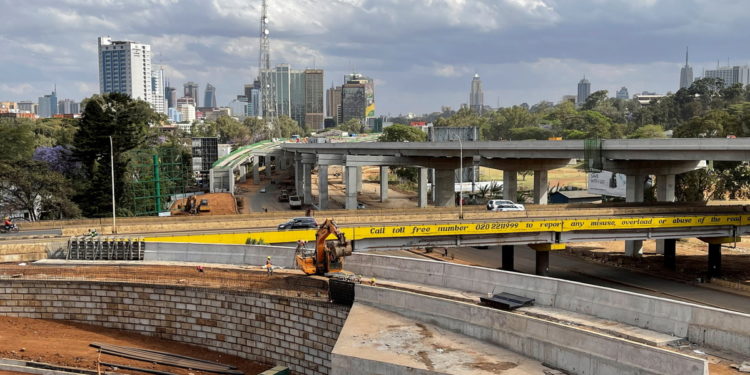Commuters are enjoying reduced traffic congestion and faster trips, and cities and towns are attracting more investment as they become more competitive.
The Nairobi-Thika Superhighway, one of the first big infrastructure projects to be carried out in Kenya by Chinese companies, has enhanced transport services and urban mobility in the Kenyan capital.
The 50-kilometer, eight-lane expressway runs from Nairobi to the outskirts of the town of Thika in neighboring Kiambu County.
Commuter Nicholas Wachira has been living along the road corridor for more than 10 years, enough time to appreciate the sharp contrast from the once traffic-plagued roadway.
“Previously, the road was chaotic with traffic congestion throughout the day. I would have preferred to run my errands elsewhere than struggle with the traffic daily,” he said. “Unfortunately, there was no option since my place of work was in town.”
Wachira, who works in central Nairobi, said the expressway has cut travel times from as much as two hours to just 30 minutes.
He said that when accidents happened on the old road, the typical two-hour trip into the city would easily double. Such delays even cost some workers their jobs.
Wachira recalls the time he had to walk the final 2 kilometers to work after a traffic accident held up the vehicle he was in.
“I arrived in the office at 10 am, having left my house before 7 am. This experience will forever remain etched in my mind,” he said.
Irene Njeri, a sales and marketing officer, said the upgraded roadway has attracted large businesses like shopping malls, banks and supermarkets. And some high-end residential estates have popped up.
“The opening up of new businesses has consequently resulted in the creation of job opportunities,” she said.
The project, which was launched in 2012, was financed by the African Development Bank to the tune of $180 million. The Export-Import Bank of China contributed $100 million, with the Kenyan government providing the rest.
‘Sweet milestone’
Built by China Wu Yi Company, Sinohydro Corporation and Sheng Li Engineering Construction, the project has provided jobs for 4,000 people.
Wachira expressed his gratitude to the Chinese government for helping Kenya to address its infrastructure deficit. He said China has the capability to help Kenya develop its infrastructure to pave the way for greater economic growth and industrialization. Wachira called the Nairobi Expressway “another sweet milestone” on this path.
Construction of the expressway is expected to be fully completed by March, enabling a further cut in rush-hour commuting trips from two hours to as little as 15 minutes.
Visiting the site on Dec 23 to mark a key stage in the project’s construction, Kenyan President Uhuru Kenyatta said the expressway-with an elevated dual carriageway-will help reduce the cost of living for many Kenyans.
Kenyatta expressed satisfaction with the progress made on the expressway, which is around 95 percent complete.
Another project that is making life easier for Kenyans is the dual-carriage Outer-Ring Road in Nairobi. The 13-km road links the Nairobi-Thika Superhighway to the Nairobi-Mombasa Highway.
It serves nearly 2.2 million people, representing 70 percent of the city’s population, and was constructed by Sinohydro Tianjin Engineering Company. The road was opened in July 2018.
According to the Africa Policy Institute, a think tank in Nairobi, the road has significantly improved accessibility for people living in the Nairobi Eastlands area, with the reduced commuting times and trucking costs.
“The project has also improved air quality for travelers, pedestrians and residents along the roadway and improved the business environment for informal traders arising from new market facilities and improved sanitation,” the institute said in a recent report.
Opportunities for business
The upgrading of the Kibwezi-Kitui-Kandwia-Usueni Road, which connects the town of Kibwezi in Makueni County with Usueni in Kitui County, has greatly benefited communities along the route.
The road has opened up several villages and created opportunities for business, including those related to agriculture.
The road, jointly funded by the Kenyan government and the Export-Import Bank of China at $442.3 billion, forms part of the Trans-African Highway. As such, it connects with the Mombasa-Addis Ababa Corridor, which in turn links with the Mombasa-Nairobi Highway at Kibwezi and the Nairobi-Addis Ababa Highway at Isiolo.
Another key roadway with backing from China is a 453 km link that forms part of the Lamu Port-South Sudan-Ethiopia Transport Corridor. The China Communications Construction Company is building the road.
Upon completion, it will become Kenya’s second main transport corridor. The first corridor runs from Mombasa to Uganda via Nairobi and the country’s Northern Rift Valley.
Paul Maringa, Kenya’s principal secretary for infrastructure, said there are 183 big infrastructure projects in Kenya that are being led by Chinese companies. He said the companies have invested $8.6 billion into the works.
“China is helping create access from one corner of the country to the other,” he said.
Maringa commended China for completing projects ahead of schedule, saying the country is setting good standards of performance.
Source: CD









